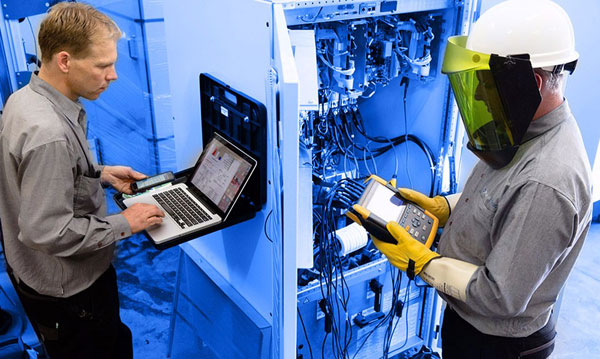
This two-day technical course also deals with the need for UPS systems. It then covers the relative comparisons between various UPS topologies and their modes of operation. The batteries used for UPS systems are also covered How a battery works, their maintenance, safety and testing is throughly discussed.
A solid working knowledge of the typical electrical and electronic components found within a UPS system is explained, as well as how AC is converted to DC and then inverting DC back to AC. When all of the above elements of a UPS are understood, a theoretical rectifier and inverter feedback loop are throughly discussed. This will be followed by a testing and troubleshooting section. Students will be given failure scenarios where they will learn how to determine which circuit component has opened, shorted or significantly changed in value to produce the alarm condition described. The course finishes with a general discussion on UPS system testing and maintenance procedures.
This UPS system training course is designed to assist organizations to identify the many savings to be gained from proper UPS system design, application, testing and maintenance..
Some working knowledge of basic electrical engineering principles is required, although this will be revised at the beginning of the course. Real-life experience in working with batteries and UPS systems will enable the course to be placed in context.
Satisfactory completion of the two-day version of this course satisfies the requirements of the Engineering Institute of Canada for the award of 1.4 Continuing Educations Unit credits.
After completion of the course the delegate will be able to:
Related Courses
Power Quality Troubleshooting Training
Modern Power Quality/UPS/Battery System Problems and Solutions
Instructor
Peter Ho, Power Quality/UPS Consultant, Electricity Forum
DAY ONE
Session 1: Power Quality - Definitions according to National Electrical Code, IEEE STD 1100, IEEE STD 519
Session 2: Transient Overvoltage Problems
Session 3: Harmonics in the Power System
Session 4: Harmonics in the Power System - Part 2
Session 5: Power Quality Survey & Power Analysis
Session 6: Power Quality Mitigation Techniques
DAY TWO
1. Review: Electrical and Electronic Fundamentals
2. Building Blocks of UPS Systems
3. UPS Specification
4. Battery Requirements
5. Static Switches ( internal and external)
6. UPS Interface
7. UPS Grounding and Neutral Configuration
8. UPS Maintenance
9. UPS System Testing and Commissioning
Questions and Answers
COURSE TIMETABLE
Both days:
Start: 8:00 a.m.
Coffee Break: 10:00 a.m.
Lunch: 12:00 noon
Restart: 1:15 p.m.
Finish: 4:30 p.m.